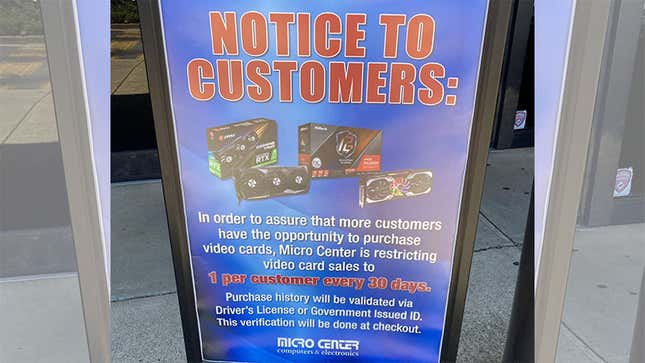
While a Micro Center in Dallas was the site of some depressing scenes earlier this month, when a huge crowd crushed against the store trying to get their hands on a new GPU, other stores in the chain have implemented far more stringent measures against scalpers and resellers.
Reddit user cubiclewarrior50 took this pic of their local Micro Center recently, and comments underneath from other customers across the country talk about similar policies having been employed at their nearest stores as well.
In this case, folks are only able to buy one GPU every 30 days, and must record their identification (either a driver’s license or “government issued ID”) when doing so. Other users are saying their stores have been doing the same thing for a few months now, and are also trying things out like leaving large signs out the front of stores “saying that they’re out of [stock] so you don’t waste your time”.
I’ve never tried to buy a GPU under these circumstances, but I am very familiar with a similar economy, namely the one around sneakers, where some brands and retailers care deeply about resellers scooping up all the shoes, while most couldn’t care less so long as every pair gets sold.
Take Nike, for example, where nearly every pair of a hyped release that drops on their site gets picked up by bots for, let’s say, $200, then resold days/weeks later for more. Nike doesn’t care because every pair is being sold, and to them it maintains an aura of desirability for their products.
For fans/customers though, it sucks and is deeply unfair. After all, if the end goal is getting shoes on the feet (or into the collections) of genuine fans, all this scenario is doing—and stop me capitalism fans if you’ve heard this one before—is creating an artificial economy for dedicated resellers that exists solely to inflate prices and make money out of thin air.
Yet a local store I buy a lot of shoes from, Supply, does the opposite. Whenever there’s a hyped release they hold a raffle, and the data entry fields (name, address, etc) are randomised after each release to make it harder for bots to be programmed for them. Many releases also require photographic ID backing up the names on the entry in order to pick up your shoes.
Is this a perfect solution? No! Neither Supply’s nor Micro Center’s are. Nothing can or probably ever will stop a single person from buying one GPU, or winning one pair of shoes in a raffle, and flipping them for $100, or from enlisting friends/family to help. Where genuine market shortages exist—whether because GPUs are hard to come by at the moment or only a limited number of sneakers are made—there’ll always be a temptation to capitalise.
Those measures are something, though, as every step you add to the purchasing process makes it harder for big resellers to get their hands on dozens or even hundreds of cards at a time and really fuck up the market. Plus purchasing limits, ID checks and raffles greatly increase the chances of individuals being able to actually get the thing they want.
Of course the big difference with my comparison here is that Micro Center and Supply are outliers, who presumably care about their customer base and want to look after them, while manufacturers and and many other big retailers clearly don’t. So long as every product they’re directly selling gets sold for what they’re asking, they’re happy to let the open market take care of the rest, fans be damned.